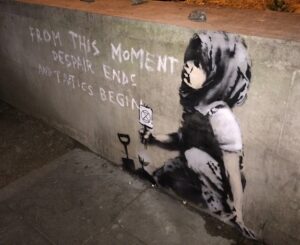In this exchange, TV host Michael Smerconish and Victoria Cobb, president of the Family Foundation of Virginia, debated the right of businesses to deny service to customers in a discriminatory manner (read story here).
Smerconish, who has a law degree, argues “everyone should be served” and disagrees with a Virginia restaurant canceling Cobb’s group’s reservation because its staff were uncomfortable with their anti-LGBQT advocacy, but thinks a baker or web designer refusing service to a gay couple is no different.
Cobb, on the other hand, distinguishes between refusing service and compelling expression. Using the baker and web designer as examples, she argued they shouldn’t discriminate by refusing all service to gay customers, but frames baking a cake or designing a website as a “free speech” issue.
Smerconish thinks it’s a distinction without a difference, but serving a meal or engaging in expressive creativity are distinctive, nevertheless. Let me put it this way: If Russia wants to hire street artist Banksy to paint pro-Russia murals, and he refuses, should a court order him to accept their business?
Many restaurants and other businesses display signs saying, “We reserve the right to refuse service to anyone.” You may have seen a sign in a restaurant that says, “No socks, no shoes, no service.” Restaurants can enforce dress codes and refuse to serve drunken or unruly customers; there’s no law against that. Some states do, however, have laws against racial and other forms of discrimination, based on society’s interest in preventing maltreatment of its citizens because of who they are.
The restaurant refused service to Cobb’s group because of who they are, and the baker and web designer refused service to LGBQT couples because of who they are, so where do you draw that line?
Smerconish and Cobb apparently agree that service businesses shouldn’t turn away anyone simply because of who they are, but Cobb correctly argues that serving food and pouring coffee aren’t the same as creating a wedding cake or designing a website, because the later involve creative expression and free speech.
As for me, I know a good law school classroom discussion question when I see one, and my opinion is more than a couple law professors will gleefully jump on this opportunity to torment their students. The question to throw at them, of course, is whether it’s a “distinction without a difference,” or one where the distinction changes the outcome.
